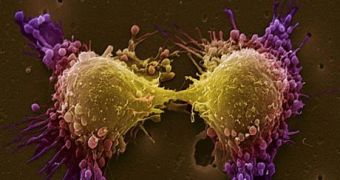Scientists at Harvard University's Wyss Institute for Biologically Inspired Engineering have recently announced that they are now carrying out a Phase I clinical trial intended to test the effectiveness of novel vaccine designed to treat melanoma, i.e. an aggressive form of skin cancer.
The Phase I clinical trial is meant to determine whether or not the vaccine is safe for use in humans. Researchers say it will end in 2015.
The cancer vaccine that is now being tested on human patients works by recruiting an individual's own immune cells and reprogramming them to go looking for cancer ones throughout the body.
When they encounter one or more cancer cells, the immune ones are supposed to destroy them.
The idea to collect human immune cells and reprogram them in such ways that their mission becomes finding and destroying cancer cells is by no means a new one.
However, until now, scientists achieved this by removing the immune cells from the body, toying with their makeup and then reintroducing them in the blood stream.
The vaccine now being tested by the Harvard Scientists works quite differently.
“The new approach uses a small disk-like sponge about the size of a fingernail that is made from FDA-approved polymers,” Newswise explains.
Furthermore, “The sponge is implanted under the skin, and is designed to recruit and reprogram a patient’s own immune cells 'on site,' instructing them to travel through the body, home in on cancer cells, then kill them.”
The researchers working on this project explain that, although the vaccine is designed to treat melanoma, it could happen that, once other investigations are carried out, it would serve to tackle other forms of cancer as well.
Before being tested on humans, the vaccine was tried out on mice. Apparently, 50% of the rodents that were administered this form of treatment showed complete tumor regression. But for their being given the vaccine, the mice would have died in about a month.

 14 DAY TRIAL //
14 DAY TRIAL //